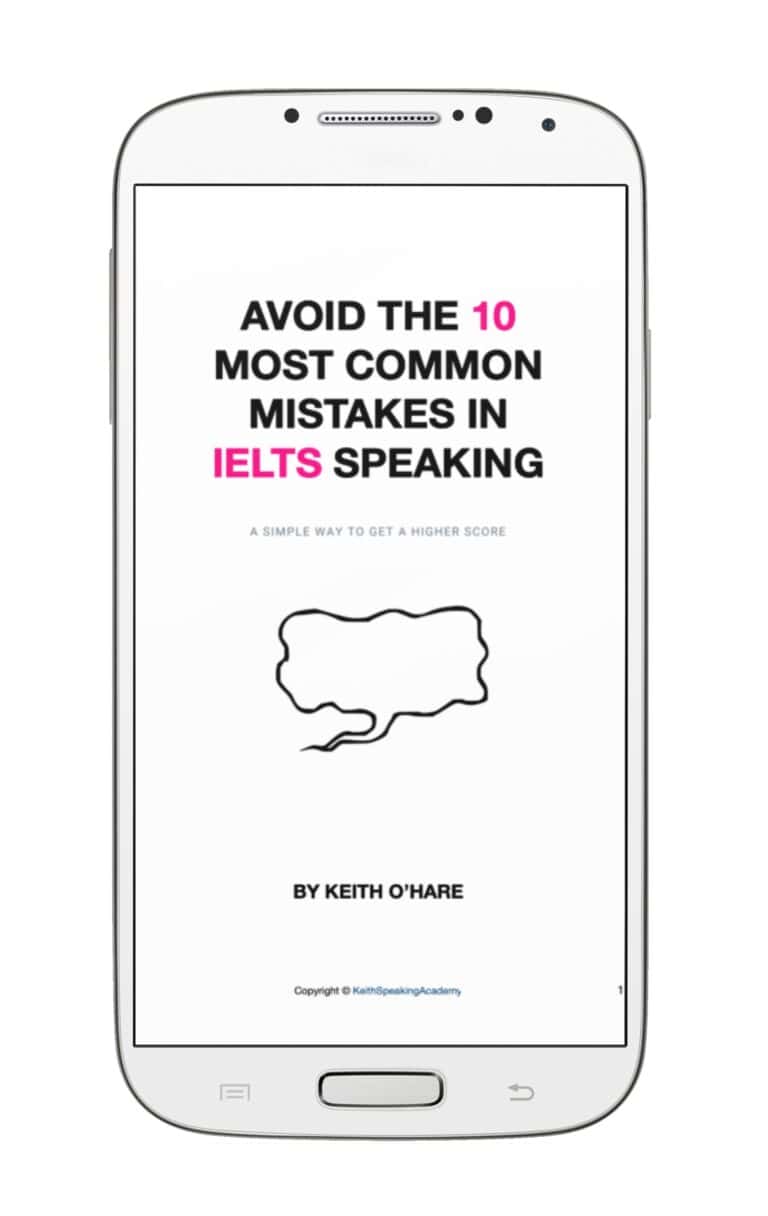Download this IELTS Speaking Lesson PDF
Introduction
The topic of business comes up a lot in IELTS Speaking, both in Part 2 and Part 3.
Whether it is about
- running a business
- large companies you are interested in
- a successful business
- how you grow a business
In this IELTS Speaking lesson on the topic of BUSINESS, you will learn how to talk about the world of business including, starting and growing a new business.
What you will Learn
IELTS Vocabulary: Business
Let’s look first at some essential vocabulary and collocations you need to talk about this IELTS Speaking topic of business.
Remember, try and make your own example sentences using this vocabulary.
Business (countable noun)
= a company
We have a lot of new businesses in this city
I want to start my own business.
Business (uncountable noun)
Trade, or buying and selling
Business is good at the moment
_______________
Now let’s look at the words used to describe different groups of people and businesses, starting from the smallest and becoming bigger.
- An entrepreneur
(someone who starts a new business)
A freelancer = a consultant
(someone who is self-employed but does work for other people or companies)
- A business = a company
We can also say,
- an enterprise = a firm
- A venture = a new business (emphasizing the risk)
- A start-up = a new business, often used to talk about technology firms
There are a lot of tech start-ups in Silicon Valley
- An industry
- Primary (mining, fishing, farming)
- Secondary (car manufacturing)
- Tertiary (services; teaching, nursing…)
- Heavy (B2B; oil, shipbuilding)
- Light (consumer-oriented; B to C manufacturing of clothes, furniture, electronic gadgets)
- A sector (contains several industries; Agriculture, Education, Retail, Financial services…)

Useful collocations
A market (where a number of companies trade)
To enter a market
To break into new markets
To discover and conquer new markets
To corner a market = to dominate a market
Unemployment (n.) the number of people without a job
The rate of unemployment has risen recently
He is unemployed
He is on the dole (Inf. UK)= He is unemployed
Debates and Discussions about Business
How small companies grow
Here are some useful expressions and phrases you can use to discuss this.
They can invest
They can seek investment
Find an angel investor =a rich person who will invest in a new company (usually become part-owner)
Get venture capital =get investment for a new business
Make a lot of sales
Open more branches (for on the ground businesses / local business)
Go global
By investing/engaging in the community
Get repeat buyers = sell to existing customers
Focus on a specific niche =a specific market segment
Take on new staff=employ new workers
Diversify = sell new (lines of) products
Don’t put all your eggs into one basket = make sure you diversify
Keep costs low
Get a subsidy = a grant, money from the government to help you
Improve the bottom line (your profit) =revenue (income) minus expenditure (costs)
Do good market research
IELTS Speaking Idioms about Business
Idioms and idiomatic expressions are necessary to get a higher vocabulary score in IELTS Speaking. Here are some useful idioms you can use to talk about the topic of business.
To take a hammering = to suffer economically
The F&B (food and beverage) industry has taken a real hammering recently.
In the recent recession, many businesses have taken a hammering
To keep your head above water = to survive
With the lockdowns, many small businesses can’t keep their head above water
To be hard hit (by…) = to suffer, be badly affected by…
Businesses have been hard hit in recent times
Cut-throat competition = very strong competition
There is a lot of cut-throat competition in the mobile phone market
- Many companies will need to go back to the drawing board / to start from scratch = to begin again (from the beginning)
- This product is a cash cow = it makes a lot of profit
- Samsung has the lion’s share of the market (= the biggest part)
- With Covid, many companies have been hard hit, but they have to bite the bullet (= resist, wait, put up with it)
Business Idioms in the News
Watch the video below and see how many idioms can you spot
The answers are at the bottom of the page!
How to create a new business
In this part of the lesson, we will answer the following questions below to start a new business.
Below are some relevant comments and language for each question.
Choose a sector (which and why?)
- Financial
- Education
- Retail
Creating a business in the education sector will help us reach the Sustainable Development Goals (SDGs)
Choose a business (which and why?)
- Set up a school
- Create a learning app
- Publish a magazine
With COVID more and more people are doing business online
I would create a learning app because education is digitalized nowadays
Choose a product or service
- Learn English
- Learn code
- Learn how to start a business
I think this is an essential skill for young people nowadays.
English is in high demand across the globe nowadays
Choose a market
- Worldwide
- India
- China
Given the global nature of online businesses, it makes more sense to aim for a worldwide market.
Choose a Target Customer
- Old people (retirees)
- Married couples
- Teenagers
Teenagers, because they are most in need of this skill-set
Many teenagers are unemployed and an online business will give them a better chance to survive
Choose a pricing strategy
- High-end price / Premium pricing
- Bundle pricing
- Economy pricing / Rock bottom prices/no-frills prices
Economy pricing is better because teenagers are not financially independent
People will be enticed to buy more with reasonable bundle pricing
I would start with rock-bottom prices to enter the market and build a customer base, then up the price to a premium one once demand has risen.
I’d opt for a bundle pricing strategy because people love discounts and always want to get a bargain

Answers to idioms in video
- Covid has hit businesses hard all over Europe
- Restaurants and hotels have taken a hammering
- Trying to get by = to survive
- Many SMEs are struggling to keep their head above water
- Many SME’s are going to hit the wall
- Go belly up = go bankrupt (lose all your money)
- So many of them, are in the same boat = same situation
- The government will give them subsidies or loans, with no strings attached = with no conditions
- It’s a no-brainer = it’s obvious, no need to think about it
Useful Links
Here are some useful ideas on how to grow a business.
Read the article and make notes of useful phrases and collocations, as well as ideas you could talk about in your IELTS Speaking test.
https://www.thebalancesmb.com/top-ways-of-growing-your-business-2948140
If you liked this lesson, leave a comment below!
There are more lessons you can follow in the links below too.
BOOKS in IELTS Speaking. Powerful idioms and expressions to talk about the kind of reader you are, and the things you like to read.
VIRTUAL WORLD in IELTS Speaking. Vocabulary and ideas to talk about the virtual world as well as some listening tasks.
JOBS in IELTS Speaking. Vocabulary you need to answer questions in Part 1, 2 and 3 for the topic of jobs.


Stan the man is hilarious 😀 😀 LOVE IT!!!
Glad you like Stan!
Hello dear sir, thanks for your lesson. I have got a question about a sentence you wrote above:
Given the global nature of online businesses, it makes more sense to aim for a worldwide market.
Does the sentence before comma have any specific grammar? I mean this sentence: given the global nature…..
would you please tell me what it is?
Thanks a lot
Hello Keith!
I wondered “Stan the man” is from the tennis player Stan Wawrinka?
Ha ha – interesting idea, but actually no, he is not based on the tennis player. Stan is just my alter ego!
Perfect
Thanks and glad you liked it